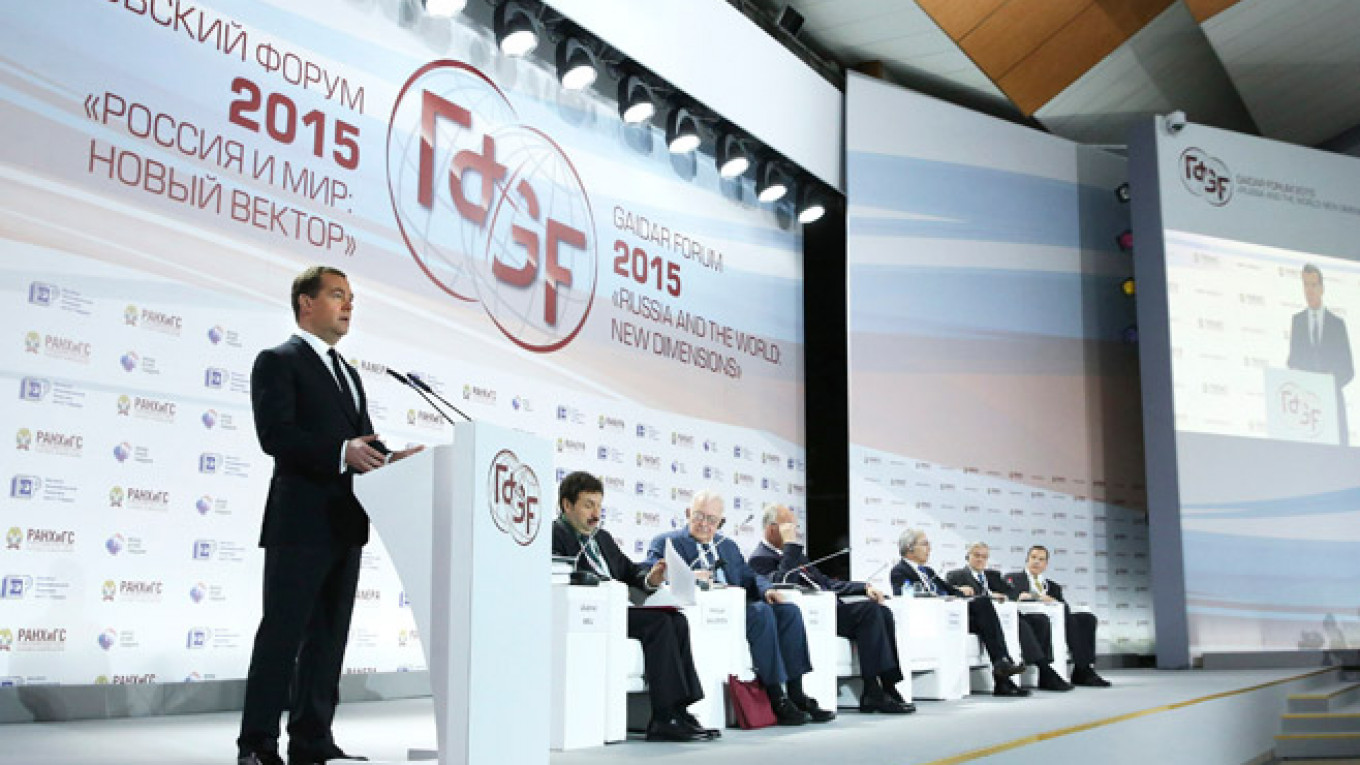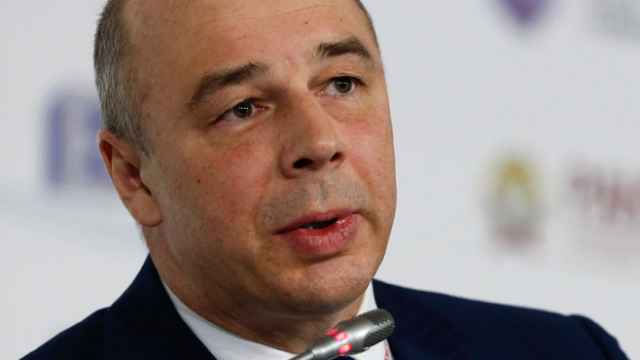While Prime Minister Dmitry Medvedev radiated confidence Wednesday that Russia would be able to use the unfolding crisis as an impetus to make necessary changes to its economy, members of his government indicated that they do not have a concrete plan for bringing about reform.
"The energy- and resource-dependent economy that was getting richer year after year is a thing of the past," Medvedev said in a keynote speech in Moscow.
The prime minister was speaking at the plenary session of the annual top-level Gaidar Forum that gathered 7,000 participants, mostly business representatives and government officials. The organizers boasted that the number of foreign participants — in particular from the U.S. — had doubled since last year.
The dramatic drop in oil prices combined with Western sanctions and weak institutions will force Russia to restructure its economy, Medvedev told the audience. The process will be painful, but the government has enough resources to facilitate it, he insisted.
Medvedev identified the main cause of the crisis as internal inefficiencies that the Russian economy has accumulated over recent years, with Western sanctions over Russia's role in the Ukraine conflict and the consequences of the 2008-09 financial crisis only increasing the pressure on already-defective economic mechanisms.
He vowed that the government would not return to a Soviet-style mobilization economy and that it would keep the ruble a convertible currency. This will allow Russia to adapt to the new conditions and modernize its economy, something that it needs to do regardless of oil prices.
While listing all the usual mantras about the need to reform, Medvedev voiced very few specific government initiatives that would bring this about, other than fostering trust between the state, society and business, and lowering barriers for private enterprises.
"The only thing we have to fear is fear itself," Medvedev said, quoting former U.S. President Franklin D. Roosevelt, who made the remark in his first inauguration speech at the time of the Great Depression in 1933.
Some of Medvedev's ministers sounded less confident.
"What kind of peace of mind can we have when we are talking about softening our budgetary policy at a time when our revenues are falling?" asked Finance Minister Anton Siluanov at another panel in the morning.
Siluanov locked horns with Economic Development Minister Alexei Ulyukayev, who argued that the flexible exchange rate is forcing the budget to adjust to the plunge in oil prices, meaning there is no need to make dramatic austerity cuts. The two ministers' contrasting positions indicated that the government lacks an overall plan on how to face the uncertain future.
"The fact that you are arguing about policy here demonstrates a lack of planning," said German Gref, head of state-run Sberbank, Russia's largest bank.
Gref warned that at the current levels of public spending and oil revenues, Russia will run out of reserves in 18 months' time.
"We believe that if [oil] prices remain at $50 per barrel […] then we will lose 3 trillion rubles ($45.2 billion) in revenues [from next year's budget]," Siluanov said, in turn.
Since June 2014, oil prices have dropped over 60 percent from their peak of $115 per barrel to $46 per barrel as of Wednesday.
Siluanov warned that if the government continues to spend as though the price of oil is still $100 per barrel, then the Central Bank will be forced to start printing more money, exacerbating the inflation rate even more. Inflation in Russia reached double digits last year, climbing to 11.4 percent.
At the same time, the drop in oil prices has reduced the share of natural resources in Russia's overall exports from 70 to 47 percent, Siluanov said.
"In essence, we are moving away from our dependency on oil," he told the forum.
Sberbank head Gref called for more wide-reaching reform.
"We need a radical shift of the economic paradigm that will crush existing stereotypes," Gref said. He suggested that the government should start by reforming the judiciary and enforcing private property rights, as well as introducing performance management in public service.
After the panel discussion, its moderator — former Finance Minister Alexei Kudrin — told reporters that there is a high probability that international credit rating agencies will downgrade Russia's sovereign credit rating to junk this year.
"The Russian economy needs restructuring; it needs perestroika," he said.
People attending the forum were mostly either skeptical or sardonic about the proceedings.
"I would only listen to Gref and Kudrin. Nobody else — including the prime minister — is of any interest," said a representative of a government agency who declined to disclose his name for fear of reprisal.
Contact the author at i.nechepurenko@imedia.ru
A Message from The Moscow Times:
Dear readers,
We are facing unprecedented challenges. Russia's Prosecutor General's Office has designated The Moscow Times as an "undesirable" organization, criminalizing our work and putting our staff at risk of prosecution. This follows our earlier unjust labeling as a "foreign agent."
These actions are direct attempts to silence independent journalism in Russia. The authorities claim our work "discredits the decisions of the Russian leadership." We see things differently: we strive to provide accurate, unbiased reporting on Russia.
We, the journalists of The Moscow Times, refuse to be silenced. But to continue our work, we need your help.
Your support, no matter how small, makes a world of difference. If you can, please support us monthly starting from just $2. It's quick to set up, and every contribution makes a significant impact.
By supporting The Moscow Times, you're defending open, independent journalism in the face of repression. Thank you for standing with us.
Remind me later.






